A keen supporter and active fundraiser for our charity, here are Kay's #7daysofIBD
DAY 1
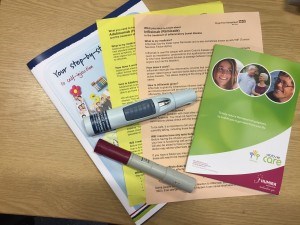 Usually my day off (I work Full-time over 4 days Tues-Fri , usually 8am-6pm). Visited new Crohn's & Colitis UK head office today to chat about fundraising ideas and how I can help with a campaign for Crohn's and Colitis Awareness Week.
Usually my day off (I work Full-time over 4 days Tues-Fri , usually 8am-6pm). Visited new Crohn's & Colitis UK head office today to chat about fundraising ideas and how I can help with a campaign for Crohn's and Colitis Awareness Week.
I have been asked to present at the local Primary Sclerosing cholangitis patient support group patient information day this weekend at the Royal Free Hospital, talking about IBD and PSC. I spent a couple of hours this afternoon putting the finishing touches to my presentation.
DAY 2
Tuesday 8am start. Answered e-mails from patients (mainly patients wanting test results; one patient had a flare and needed an earlier appointment, GP wanting advice about a patient they saw in clinic, patient telling me she was pregnant and wanting to know about safety of medications, another patient who was symptomatic with Colitis so I advised to alter medication dose and call back in 7 days for review.)
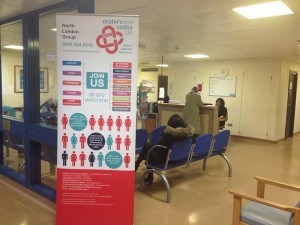 Then straight to the nurse-led IBD clinic for 9.30am. Here I have my own list of 8-10 patients and see patients independently. Had an interesting and mixed clinic. Most people were well and just coming for a routine check-up. Two people were on azathioprine so I checked their 3 monthly bloods to make sure there were no side effects. One patient was having problems obtaining the azathioprine medication from the GP so I dictated a letter and sent a copy of our shared-care protocol to the GP that sets up an agreement with the GP to share responsibility of prescribing and monitoring bloods with the IBD team but also tells them what to do in the event of side-effects or abnormal bloods.
Then straight to the nurse-led IBD clinic for 9.30am. Here I have my own list of 8-10 patients and see patients independently. Had an interesting and mixed clinic. Most people were well and just coming for a routine check-up. Two people were on azathioprine so I checked their 3 monthly bloods to make sure there were no side effects. One patient was having problems obtaining the azathioprine medication from the GP so I dictated a letter and sent a copy of our shared-care protocol to the GP that sets up an agreement with the GP to share responsibility of prescribing and monitoring bloods with the IBD team but also tells them what to do in the event of side-effects or abnormal bloods.
One patient had been diagnosed with Ulcerative Colitis (UC) for 13 years and had not had any investigations for a number of years. I discussed the importance of bowel cancer screening and arranged a colonoscopy and gave them a IBD Nurse telephone appointment in 2 months to discuss the results.
Another patient I had previously spoken to via the IBD advice last week. They had grumbling symptoms of UC so I advised over the phone to increase the dose of mesalazine tablets. Today in clinic the symptoms had improved a little but not 100% so I advised to start mesalazine enemas and suppositories. I am an independent nurse prescriber so I was able to prescribe the medication and gave the patient a follow-up telephone appointment in 2 weeks so I could check they are ok and responding to treatment.
In the afternoon I caught up on my admin. We are currently undertaking audits looking at fatigue in IBD and the use of new screening tests for people due to start biologics treatments. I met with the medical student who is helping us with the audit to look at the data and to start writing the results ready to submit to Gastroenterology conferences next year.
We are also looking at getting a 4th IBD nurse and so I had a meeting with the team to discuss putting a business case together.
We are lucky to have an IBD administrator who takes most of the calls. She deals with non-clinical things such as appointments but the IBD nurses call patients back for things such as test results, specific IBD queries, prescriptions, disease advice regarding symptoms or changing medication. The calls were much the same as this morning. I chatted to a few patients who were slightly symptomatic and I advised them to alter medication. The advice line is great for this sort of thing as it allows patients to seek advice without taking time to visit the GP or attend clinic.
DAY 3
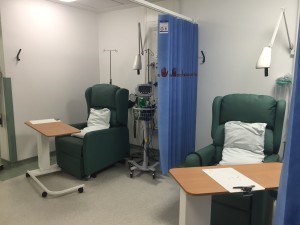 8am start and straight to IBD MDT radiology meeting. Here we discuss the test results of people who have had recent CT, MRI, x-rays with other members of the Gastroenterology team, radiologists and surgeons. From here I went to the office, answered e-mails and a few advice line calls that had been left overnight and then headed to the IBD clinic. This is the main clinic of the week and is attended by 2 IBD nurses, junior doctors, 4 consultant gastroenterologists and a dietician. Usually about 75 people in clinic and the waiting times can be long. Here I see patients independently but am also on hand to support patients in their consultation with the gastroenterologist and facilitate investigations. I also carry a bleep so people within the hospital can contact me and I am usually regularly bleeped about patients who have been admitted as an inpatient or those who are attending for day-case infusions of infliximab or Iron. Today is no exception and I am bleeped several times to sign prescriptions for patients who have turned up for their infusion unexpectedly or to review others to ensure they are safe to go ahead with the treatment.
8am start and straight to IBD MDT radiology meeting. Here we discuss the test results of people who have had recent CT, MRI, x-rays with other members of the Gastroenterology team, radiologists and surgeons. From here I went to the office, answered e-mails and a few advice line calls that had been left overnight and then headed to the IBD clinic. This is the main clinic of the week and is attended by 2 IBD nurses, junior doctors, 4 consultant gastroenterologists and a dietician. Usually about 75 people in clinic and the waiting times can be long. Here I see patients independently but am also on hand to support patients in their consultation with the gastroenterologist and facilitate investigations. I also carry a bleep so people within the hospital can contact me and I am usually regularly bleeped about patients who have been admitted as an inpatient or those who are attending for day-case infusions of infliximab or Iron. Today is no exception and I am bleeped several times to sign prescriptions for patients who have turned up for their infusion unexpectedly or to review others to ensure they are safe to go ahead with the treatment.
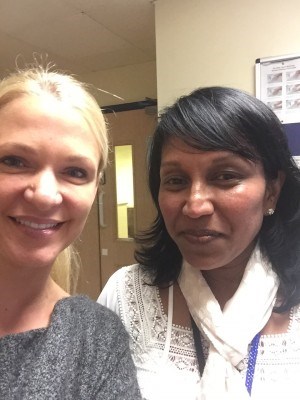 Following clinic we have our Biologics MDT meeting which is co-ordinated and lead by an IBD nurse (today it is my turn) and attended by the IBD secretary, Gastroenterologists and pharmacists. During the meeting we discuss all patients on infliximab, humira and Vedolizumab who are coming to the end of their 12 month funding (Usually 5-6 per week). Myself or our other IBD nurse, Muditha, presents each case and we discuss the investigations, patients' symptoms and response to medication. We then complete necessary paperwork to either apply for a further 12 months treatment or, if the patient is well and IBD is in remission, arrange a clinic appointment for the patient to discuss stopping treatment.
Following clinic we have our Biologics MDT meeting which is co-ordinated and lead by an IBD nurse (today it is my turn) and attended by the IBD secretary, Gastroenterologists and pharmacists. During the meeting we discuss all patients on infliximab, humira and Vedolizumab who are coming to the end of their 12 month funding (Usually 5-6 per week). Myself or our other IBD nurse, Muditha, presents each case and we discuss the investigations, patients' symptoms and response to medication. We then complete necessary paperwork to either apply for a further 12 months treatment or, if the patient is well and IBD is in remission, arrange a clinic appointment for the patient to discuss stopping treatment.
Today we have another meeting planned to discuss implementation of the IBD registry database. The Royal Free are one of the 'pilot-sites' for this project and I have taken the lead on this project, along with one of the gastroenterologists, having regular meetings with the team to discuss how we are going to start using this.
After all the meetings it is back to my desk to answer advice line calls and e-mails (15 phone calls and 10 e-mails from patients since this morning). The calls are much the same as most days. Today I also had a call from a patient who had started a new medication a few days ago. They rand to say they were feeling unwell so I advised them to come in for a blood test to check they were not getting side effects.
I also have referrals from the gastroenterologists to apply for funding for patients to start biologic treatments. This is a process that requires completing a detailed form to send to the commissioners as the use of these drugs is controlled by national guidance (NICE). In each form I have to explain why each patient requires biologics treatment and give a detailed history of what medications have been used previously and why we think they meet national NICE guidance. Some patients have already had funding approved so I them call them to discuss the treatment, answer any questions and arrange the first appointment with the day-case unit.
DAY 4
I usually have my telephone clinic today where I review about 10 patients. The telephone clinic allows people to be reviewed and have a check-up of their symptoms or progress without having to come into the hospital. I typically have about 10 patients in my clinic and it is usually best for those that need a review following investigations or after starting a new medication to check that they are having no problems. Today is very different though and I have a break from the hospital as I am travelling up to Leeds for an interview.
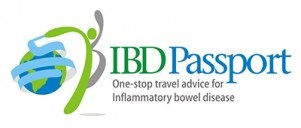 I have applied to the National Institute of Health Research for a fellowship grant which, if I am successful, will fund me to undertake research into the experiences and impact of travel& IBD. This is an extension of a previous study I did which culminated in the development of the IBD Passport travel website. Very nervous as I will be interviewed by 15 professors about my research project. Fingers crossed; I find out if I am successful in 4-6 weeks!
I have applied to the National Institute of Health Research for a fellowship grant which, if I am successful, will fund me to undertake research into the experiences and impact of travel& IBD. This is an extension of a previous study I did which culminated in the development of the IBD Passport travel website. Very nervous as I will be interviewed by 15 professors about my research project. Fingers crossed; I find out if I am successful in 4-6 weeks!
DAY 5
Another early morning meeting at 8am. This time it is the team meeting to discuss all the inpatients. This is not just people with IBD, but any gastroenterology problem. We usually only have a few people with IBD admitted to the hospital at any one time but this can obviously vary. This meeting ensures the medical team working over the weekend know about each patient and what the plan of care is.
Today is also my last clinic of the week; another nurse-led clinic where I have 12 patients booked into my clinic. It was a nice clinic as most people were well and in remission but I saw one gentleman who was referral to the hospital because of symptoms of bleeding and diarrhoea and weight loss. Investigations showed that he has Crohn's Disease and this appointment was the first one after the tests where I explained the diagnosis, started him on medication and gave him some information about IBD to read at home. I also saw another lady who was feeling well but wanted to discuss pregnancy and fertility as she was thinking of starting a family. After each consultation I dictate a letter to the GP and next week I will chase-up any blood test results or investigations I have ordered.
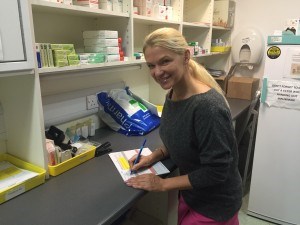 After clinic it was a quick stop at the day-case unit to sign prescriptions for people coming in for infliximab treatment next week and then back to the office to catch-up on admin. We have to update our drug protocols every 2 years. This is a document that outlines each drug used in IBD, how we should use it, what pre-treatment tests should be done etc... to ensure it is prescribed and used safely. This afternoon I made a start on writing a protocol for Vedolizumab as we have just started using it at the hospital. Once I have finished writing I will send to the other team members and pharmacists so that we can agree on the content and start using it. We have an excellent network of IBD nurses in the UK so we all often e-mail around the group when we have patient information or protocols to write to see if someone has already written one. No point re-inventing the wheel!
After clinic it was a quick stop at the day-case unit to sign prescriptions for people coming in for infliximab treatment next week and then back to the office to catch-up on admin. We have to update our drug protocols every 2 years. This is a document that outlines each drug used in IBD, how we should use it, what pre-treatment tests should be done etc... to ensure it is prescribed and used safely. This afternoon I made a start on writing a protocol for Vedolizumab as we have just started using it at the hospital. Once I have finished writing I will send to the other team members and pharmacists so that we can agree on the content and start using it. We have an excellent network of IBD nurses in the UK so we all often e-mail around the group when we have patient information or protocols to write to see if someone has already written one. No point re-inventing the wheel!
Later in the afternoon I went onto the wards review some of the in-patients (only 2 today) who have been admitted with IBD. One person was a new diagnosis of Ulcerative Colitis so I had a chat about the disease, gave them Crohn's & Colitis UK's new diagnosis pack and the IBD advice line details. The second was a patient I know well. She was due to start infliximab so I discussed this with her and answered any questions.
Then its home (via the pub for a glass of wine!)
DAY 6
Today I am presenting at the PSC support patient day that is being held at the Royal Free Hospital. They have asked me to do presentation about IBD and PSC. The presentation was only 20 minutes and then I stayed for Q&A.
DAY 7
REST!

